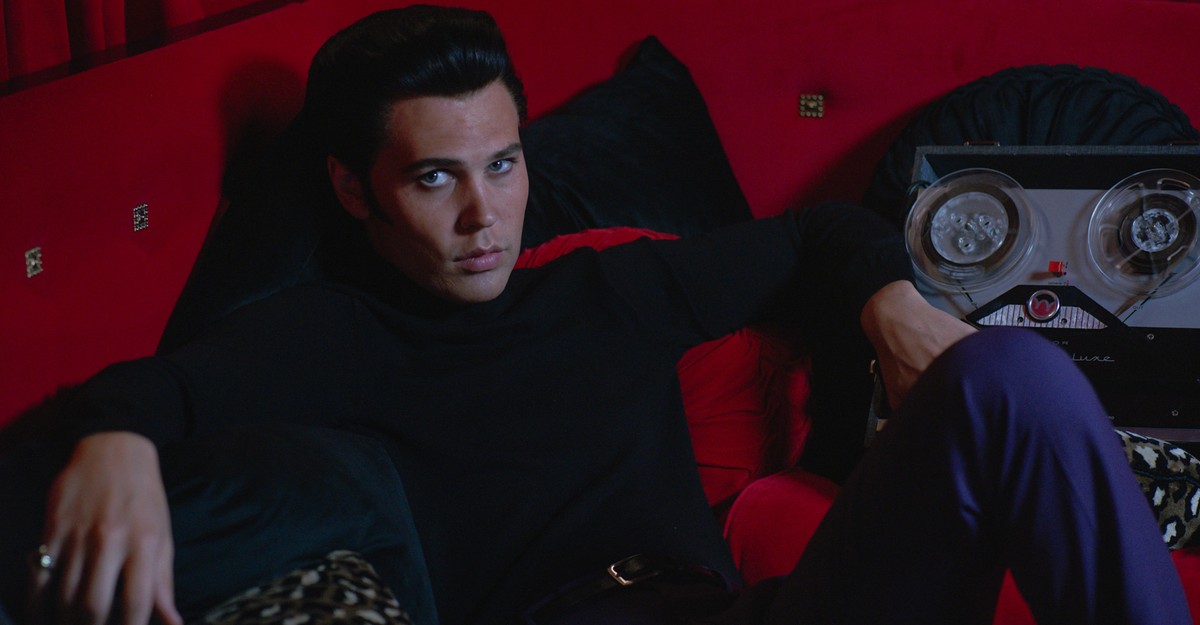Baz Luhrmann is a filmmaker who picks subjects as extravagant as the genre allows. When he made a teen romance, it was William Shakespeare’s Romeo + Juliet. His musical Moulin Rouge was scored with love songs from nearly every pop era. For a literary adaptation, he went with the totemic, supposedly unadaptable The Great Gatsby. He’s an Australian director who made a movie about Australia and literally called it Australia. So when Luhrmann decided to make a biopic about a musician, he unsurprisingly alighted on a rock-and-roll singer of some notoriety: Elvis Presley.
The connection between subject and filmmaker is abundantly clear. Presley was a beacon of ostentation the likes of which may never be eclipsed. He earned his fame through pure showmanship and then swathed himself in many, many layers of luxurious ridiculousness over the years. Luhrmann has, for three decades, made maximalist movie experiences where even the quietest dialogue sequences glitter and are edited with MTV-music-video intensity. The director, who never met a humble ballad he couldn’t adorn, is thus a perfect fit for Presley’s story, which began with the simplicity of his early singles but ended in rhinestone-studded profligacy.
Elvis, the resulting biography starring Austin Butler in the title role, is quite a messy experience. It sometimes functions as a full-blown musical; other times, it forgets to demonstrate its protagonist’s colossal onstage talent. The script is bound to the familiar beats of Presley’s life, even as Luhrmann’s flashy direction tries to eclipse the staid formula of the music biopic, the rise-and-fall narrative that’s so well known, it was mocked by the devastating 2007 satire Walk Hard. Luhrmann’s approach works for one reason: Elvis should be a mess. Presley’s adult life was chaotic, and it unfolded almost entirely in public, from his spectacular successes to his ignominious decline. Watching it play out on film ought to feel a little disorienting.
That’s my best explanation for why I thoroughly enjoyed Elvis, despite some storytelling bloat and final-act aimlessness. The film is fueled by Luhrmann’s hyperactive style, of which I count myself a fan, even though I realize how polarizing it can be. Had the director decided to tell the tale of some introverted, somber singer-songwriter—think Ian Curtis or Nick Drake—his approach might feel garish, but Presley’s life (and death) were the stuff of National Enquirer legend. Luhrmann understands how to splash that melodrama across the big screen in the boldest colors.
Elvis is narrated by Colonel Tom Parker (played by Tom Hanks), Presley’s dictatorial manager, who is painted as a villain squeezing money out of the star while keeping his career choices uninspiring and safe. Hanks’s performance as Parker reminded me most of the heavily made-up goons he played in Tom Tykwer and the Wachowskis’ gonzo epic, Cloud Atlas. He’s buried under pounds of latex, sports a swollen nose, and delivers his lines in a heavy Dutch accent, alluding to his hidden past as a carnival worker from the Netherlands. To Luhrmann, Parker is the twisted showman behind the Elvis myth, helping him vault to stardom through some clever promotion but then trapping him in a series of gilded cages to keep him under control. Hanks leans into that malevolence with cartoonish relish; this is the furthest thing from the “America’s Dad” material the actor provided in other biopics, like Sully or Bridge of Spies.

The counterweight to Hanks’s overblown Goldmember homage is Austin Butler, a journeyman actor who is extraordinarily charismatic as Elvis, tapping into the singer’s showstopping persona and bravely contributing his own vocals to the movie. From the minute Elvis saunters onstage as a relative unknown in the film’s opening sequence, Butler is transfixing, brimming with gaudy confidence but also coming across as a genuine innocent. Elvis is completely baffled when the girls in the audience start screaming at what his bandmate dubs his “wiggle” (the way his hips shake when he sings), but he quickly leans into it, and Luhrmann presents the ensuing chain reaction of hysteria with all his fizzy, over-the-top panache.
Presley was so energetic as a singer that his producer had to place mics around the entire studio to capture his recording of “Heartbreak Hotel,” because Presley was given to jumping around while he sang. That’s what Luhrmann tries to do in Elvis, hopping from Presley’s local hype to major-label stardom, from his movie career to his military service, sprinkling in his marriage to Priscilla Presley (Olivia DeJonge); the death of his beloved mother, Gladys (Helen Thomson); and his relationships with the African American musicians, such as B. B. King (Kelvin Harrison Jr.), who inspired his career. Even at 159 minutes, the film can’t possibly cram every detail in, so instead Luhrmann just mixes in his favorite ingredients from the Elvis cocktail.
The film’s most traditional aspect is its three-act structure, organized by the three major performances the singer gave—his 1953 introduction as a scandalous rookie singing the songs of Black musicians, his 1968 comeback on a groundbreaking TV special, and the absurd spectacle of the Vegas residency that marked the final years before his death in 1977. Through Luhrmann’s lens, Elvis transforms from someone striking and fresh to a relic clinging for relevancy in a changing world. Luhrmann presents the familiar narrative with enough verve to make it feel new, successfully balancing Elvis’s inherent specialness with what rendered him, in his untimely end, a glamorous fossil, waiting to have his talents unearthed again and again by future generations.
